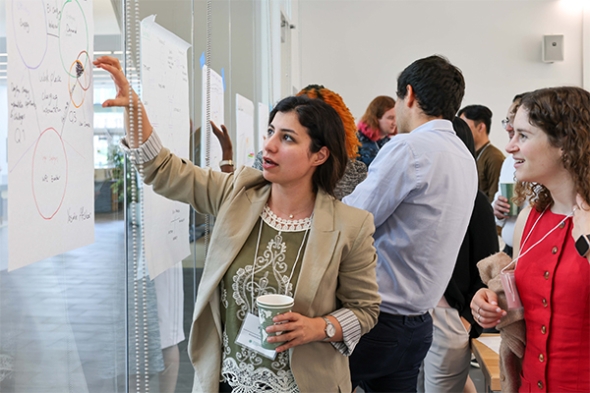

On June 25th, the Irving Institute successfully concluded its fourth annual New Energy Summer Summit—a transformative four-day workshop aimed at inspiring interdisciplinary collaboration among early-career scholars.
While many academic disciplines tend to operate in silos, true innovation is often sparked at the intersection of seemingly disparate fields. Connecting across traditional disciplinary boundaries is particularly critical in addressing our most pressing and complex global challenges like climate change and energy transitions. As interdisciplinary and transdisciplinary research become more mainstream in these spaces, there is a rising need for climate and energy scholars to develop new collaborative skillsets and ways of thinking. The New Energy Summer Summit serves as an intimate and safe space for early-career scholars to build their capacity to connect across disciplines through active discovery and practice. It also invites them into a lifelong community committed to these dynamic and powerful approaches.

"The New Energy Summer Summit 2025 was truly phenomenal! An unforgettable week at the Arthur L. Irving Institute for Energy and Society at Dartmouth, surrounded by brilliant minds from around the world — spanning social sciences, engineering, humanities, and natural sciences. Together, we explored everything from energy justice and equitable infrastructure to reimagining market design, cross-sector collaboration, and community-engaged research. I left with a head full of ideas, a heart full of gratitude, and friendships and collaborations that will last a lifetime," shared S. Mohsen Fatemi, a PhD candidate in Public Administration at the University of Kansas.
This year's summit was the most competitive yet, with close to 200 applications vying for 26 spots. Participants ranged from PhD candidates to post-doctoral fellows to assistant professors, hailing from institutions as varied as UCLA, Michigan State, and MIT, and internationally from Fulbright University of Vietnam.

In the opening session led by Sarah Kelly, PhD, speakers Erin Mayfield, PhD, an assistant professor of engineering, and Melody Brown Burkins, PhD, director of the Institute of Arctic Studies at Dartmouth, discussed integrating interdisciplinary approaches and community engagement in their fields.
Erin Mayfield, formerly Assistant Director for Net Zero Pathways at the White House, spoke about decarbonizing U.S. manufacturing. She stressed the need to integrate social and environmental factors into models, focusing on aligning climate goals with worker benefits. Melody Brown Burkins, also the University of the Arctic Chair in Science Diplomacy and Inclusion, emphasized involving local communities and respecting indigenous knowledge. With decades of experience in indigenizing Arctic research, she highlighted the value of combining research efforts with community partners to respect cultural nuances.
In closing, both Mayfield and Burkins acknowledged the extra effort required to integrate different knowledge systems and perspectives, as well as the challenges of cross-disciplinary collaboration in academia while stressing its importance. By improving communication, fostering active listening, and integrating diverse perspectives, stronger relationships and common ground can be achieved for research that informs robust and durable policies and innovations.
Before delving into collaborative projects, the summit began with five-minute lightning talks in which participants shared their work on energy transition and climate change challenges. With backgrounds in fields like engineering, political science, and environmental studies, the presenters tackled a wide range of topics, underscoring the complexity and interconnectivity of global energy challenges.

"Designing and delivering my lightning talk was a rewarding experience that challenged me to communicate my research clearly and impactfully within a short timeframe. It pushed me to distill complex ideas into key messages that could resonate with a diverse audience. The supportive environment made it easier to engage confidently, and the feedback I received was constructive and encouraging. Attending other participants' lightning talks was equally valuable—I was exposed to a wide range of innovative projects and perspectives, many of which sparked ideas for future collaboration. Overall, the session was dynamic, intellectually stimulating, and one of the highlights of the summit." – 2025 Summer Summit Participant

Participants then engaged in group projects promoting hands-on collaboration to produce a mock product. The process of scientists working with others from the social sciences or humanities highlighted the importance of clear communication. The summit created a safe space where scholars could comfortably ask questions and learn through collaboration. One participant noted, "Working in a team to create a 'product concept' was a dynamic and eye-opening experience. It highlighted the value of combining diverse disciplinary strengths to tackle real-world problems creatively. One key insight was how differing communication styles and priorities can initially pose challenges, but with open dialogue, they ultimately lead to more innovative and inclusive solutions."
Another participant reflected, "We determined that even though we worked in vastly different disciplines that we had powerful intersections and overlaps. Being able to work collaboratively emphasized to me the strength of collaborative scholarship and I think this served as a recommitment for myself to do future such projects."
meganlitwhiler_2021.png
Megan Litwhiler, Assistant Director of Academic Programs"Through continuous practice, evaluation, and iteration, each year's New Energy Summer Summit surpasses the previous one. We gain invaluable insights from our participants just as they benefit from our program. This work is vital to equipping early-career scholars with the skills and networks necessary to address complex challenges entwined in the energy transition and climate change mitigation. While the task of building this community is both humbling and immense, the relationships forged each year—and strengthened through ongoing collaboration—energize us. Together, we are co-creating a community capable of driving innovation igniting unconventional partnerships, and it is a true privilege to participate in this transformative journey." – Megan Litwhiler, PhD, Assistant Director of Academic Programs
Below, you can view more of the 2025 New Energy Summer Summit participants' takeaways on LinkedIn: